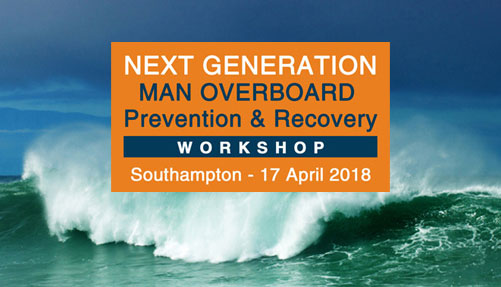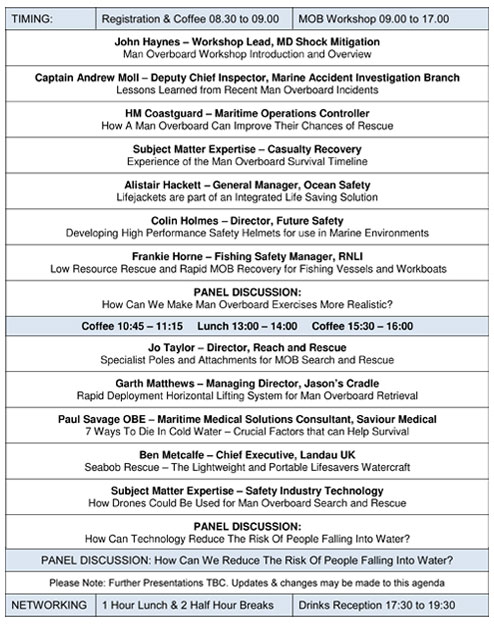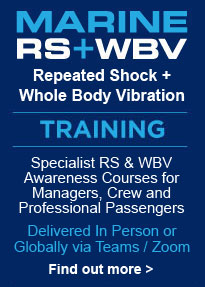

In April 2018 over 80 maritime professionals attended the MAN OVERBOARD Prevention & Recovery Workshop in Southampton UK. The fast moving and dynamic one day event brought together an international group of experts armed with the latest knowledge to identify problems that affect the maritime sector worldwide, with particular focus on the sub IMO / sub 80 feet sector.
Workshop lead, John Haynes opened the day saying, 'Preventing and dealing with man overboard situations is relevant to all people going on, or working near to water. The sessions focus on current issues, plus emerging areas of concern that operators may need to face tomorrow. In a changing world the use of technology is increasing for many organisations, but basic safety remains high on the agenda for professional mariners.'
Click on blue links below for presentation information
The Marine Accident Investigation Branch (MAIB) investigates marine accidents involving UK vessels worldwide and all vessels in UK territorial waters. Inevitably, the MAIB have man overboard (MOB) accidents to investigate, many from commercial fishing vessels, but the lessons from these extrapolate easily to the small commercial sector. Captain Andrew Moll - Deputy Chief Inspector of the MAIB highlighted specific lessons learned from recent incidents that are relevant to all maritime sectors.
Her Majesty's Coastguard (HMCG) is a section of the Maritime and Coastguard Agency responsible for the co-ordination of all maritime search and rescue (SAR) within the UK Maritime Region. Karen Bosman - Maritime Operations Specialist, HMCG highlighted how an MOB can improve their chances of rescue. Various detection aids were discussed and how to best utilise them, along with various communication devices, and which work best from a search and rescue perspective.
At this point it was highly relevant to hear from Andy Proudfoot who recounted hard lessons learned from the man over board’s perspective. Heading from Wales to Ireland for the start of the 2013 Round Ireland Challenge, he was the solo occupant of the 5 metre RIB ‘Merlin’ when he was ejected into the water 18 miles off St Ann’s Head in the Irish Sea. The handheld VHF attached to his lifejacket had smashed into several pieces on impact with the water. The kill cord was still attached to his leg, but he couldn’t see the boat, then saw it some 50 to 75 metres away. The engine had stopped – the kill cord had worked. But it rapidly became apparent that, as the RIB had more windage, the distance between him and the boat was opening up all the time.
Solo operators, and small boat operators with minimum crew numbers, need to consider how they can achieve rapid recovery of a person in the water without outside assistance. Frankie Horne - Fishing Safety Manager of the RNLI presented on methods to achieve low resource rescue and rapid MOB recovery for fishing vessels and workboats. In 2017 fishermen from across the UK and Ireland took part in a series of exercises run in the RNLI College sea survival pool to improve MOB survival techniques and recovery procedures. The pool, which is used to train RNLI lifeboat crew members, features realistic temperatures and can replicate artificial waves, rain and wind conditions.
Maritime medical solutions consultant Paul Savage of Saviour Medical is Chairman of the UK Search and Rescue Medical Group which shapes the future and direction of UK SAR medicine. Drawing on nearly 30 years of search and rescue service with the RNLI and HM Coastguard, combined with the very latest medical research, he explained the detail of what actually happens to the human body’s physiology when immersed or submersed in cold water. His presentation titled, ‘7 Ways To Die In Cold Water’ highlighted crucial factors that can help survival.











